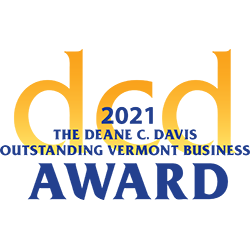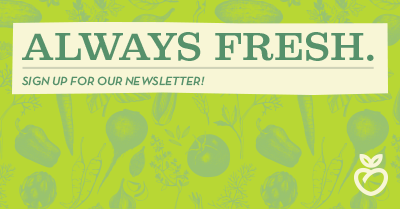Women in Business: Eliza La Rocca of Farmhouse Chocolates + Ice Cream
Eliza La Rocca co-owns Farmhouse Chocolates + Ice Cream with her husband Erlé in Bristol, Vermont. They live to make chocolates, ice cream, and sorbet that are simple, but sublime; that bring joy; that are made with the highest quality local and organic ingredients. You can find their chocolate and ice cream at our South Burlington, Vermont location.
1.) What’s your business’ origin story? How did it all start?
My husband, Erlé LaBounty, started a business called Farmhouse Truffles 21 years ago, when he was 16. He was a student of his high school’s vocational culinary program and later went on to attend NECI in Montpelier, but he began making dark chocolate truffles and chocolate covered almond pralines using single origin chocolates out of his grandfather’s farmhouse in Randolph, VT. Erlé grew up working on the family dairy farm and is one of the hardest workers I know. He also happens to be totally obsessed with food, and for some reason, the alchemy of chocolate spoke to him. He’s never looked back.
When we met in 2010, I had recently moved back to the U.S. after leading food and wine tours in Italy for a few years, and I moved up to North Pomfret, VT to work with an amazingly talented creative team of producers, Deirdre Heekin and Caleb Barber, both at their just recently closed Woodstock restaurant, Osteria Pane e Salute, as well as on their then-fledgling biodynamic vineyard in Barnard. They couple has now won domestic and international awards for their biodynamic Vermont wines. Erlé had been their pastry chef and sous chef for 6 years and we met through them.
I’ve always been interested in far too many fields to comfortably settle on any one, so I soon found myself helping him grow the business, while working several other jobs to make ends meet.
The result: after 17 years of being a part-time chocolatier with a day job, Erlé transitioned to full-time self-employment in 2014, and I followed suit a year later. Since then, in addition to sales, packaging design, marketing, packaging, and basically everything else that isn’t making chocolate, I’ve taken on making a line of organic ice creams and sorbets from scratch (pasteurized in-house, made start-to-finish solely by me).
We just made our first hire, and it couldn’t come too soon! Erlé and I are very thankful for what we have, but we need to start training others to help us as we continue to grow, and that’s very exciting.
2.) What is the most rewarding part of owning your own business?
That’s a funny question, because when I start to list the best things about running our company, they are often just a different take on the most challenging parts of running our company! For example, I would say that there is nothing quite like the feeling of having created something that you are perfectly happy with and immensely proud of, whether that’s a new label, and email newsletter, or the perfect salted caramel. But those moments are also incredibly few and far between. Most of the time one is never fully satisfied with one’s efforts, and one is always worrying in the back of one’s head, “will my customers like this flavor as much as I do? Will my buyers get behind the pricing and the packaging? Have I done enough?” Running your own company, you’re the offense and the defense, the front line and the rear guard. It can get lonely for the first several years, carrying the weight of each and every job involved in running a company. Of course, that’s why the highs are so incredible. But if I’m honest, I also spend a lot of time worrying, dissatisfied, and just constantly wondering, questioning, researching, pondering. All of that never ends.
3.) What are some of the challenges?
I feel like it’s really hard to realize that you’re over-extended (wearing too many hats, carrying too much of a load), until you’re nearly burned out and about to lose it! This is probably because most entrepreneurs have a higher tolerance for long hours and just doing whatever it takes. But it’s not always healthy or efficient. On the other hand, you don’t have the budget for employees until you’re grossing enough. Since our model of growth has been largely self-financed rather than capital heavy on the front-end, we didn’t budget soon enough for employees, and we’ve paid the price. However, we’ve learned from our experiences, and we, the business, and even our marriage, which is my perennial joke, have all survived and come out stronger. But it’s been too much sometimes because of our growth model.
4.) Name one company or business owner that you really admire and why.
There are so many amazing entrepreneurs in Vermont alone, many of them women. So, while there are many small business inspirations and sources of support in my life, the ones that will always hold a very special place in this very special group are Deirdre Heekin and Caleb Barber, of La Garagista wine label (Barnard, VT). Partly, this is because when I moved to Vermont to work with them, I fell in love with a place for the very first time in my life. I also fell in love with my now-husband the same year. So working with them was a spectacularly memorable experience in many ways. But not least because they are two truly incredible people. They give as much support, training, and opportunity for growth and vitality to their employees as they pour vim and vigor and beauty into their products. They inspire me as business owners because, throughout their evolution as a business and a brand, they have figured out how to surround themselves with the beauty of nature, of food and wine, and friends. They create aesthetically beautiful spaces and products and never apologize for seeking out beauty. They also do so without compromising the quality, authenticity, and sustainability of their products. They flex, but they don’t compromise. They’re smart, they create things that people want and benefit from. But they deal in “non-essentials”: fine food and wine, grown and processed ethically and sustainably, but with an undeniable hedonistic purpose. You can’t survive on wine alone. Nor can you survive on chocolate or on ice cream alone. But this doesn’t mean we shouldn’t dedicate decades of our lives to making the most responsible, beautiful, creative, and pleasurable forms of these strictly non-essential items. We can do a lot of good, we can support organic and local agriculture, create local jobs, etc. And we can become smarter business people with each year that goes by, while also creating a life for ourselves that is fully of beauty and community and very much worth living. But with constant financial pressure, logistical strategizing, operational hiccups, zero days off for much of the year, etc….I have to remind myself of all this quite often! It’s all a process.
5.) What advice do you have for other women out there that might be thinking of starting their own endeavor?
Don’t reinvent the wheel if you can avoid it. Sometimes (maybe often) you will not be able to avoid it. But reach out to other producers, suppliers, buyers, distributors, creators, and customers with your questions. There is so much that you can’t know. So ask, then try to make it your own. To me, that is networking it its most essential form: remembering to simply reach out, constantly. There is an African proverb along the lines of, “No one will open the door if you do not call out.” You will have to rely on yourself plenty. But don’t pick the hard way just because it’s hard. This is something my husband and I constantly find ourselves doing 🙂 Hard work is essential. But keep asking questions, researching, taking courses, reading. In the beginning, you will not get answers so much as you will learn to ask smarter questions; to look at your business differently. The day we have it all figured out is probably the day we’ll think about selling.
Also, don’t apologize or over-explain. I think we’re socialized to do that as females. Be proud and confident (not apologetic or defensive) always, even if you’re faking. And don’t not do something just because it’s not perfect yet. Perfectionism will drive you to keep reaching and striving and that’s great. It can also hold you back at every stage. That’s up to you.
Lastly, financials are important. Even if you’ve already started your business, go back and take personal financial courses, business plan writing courses. Keep doing this. It can feel shameful to not have as much financial literacy as we like, but most people are in the same boat. Just chip away at it, that’s the responsible thing to do. Educate yourself and overcome all the emotions around money. It’s a tool. Money shame, fear, etc. is common and natural and also something we need to grow out of, educate and practice ourselves out of. It’s possible and it’s necessary.



